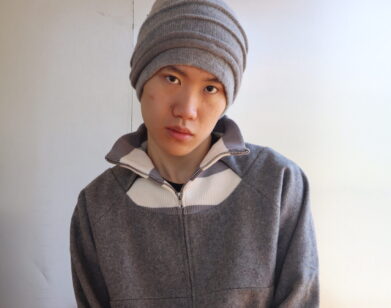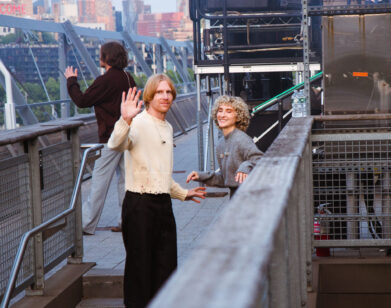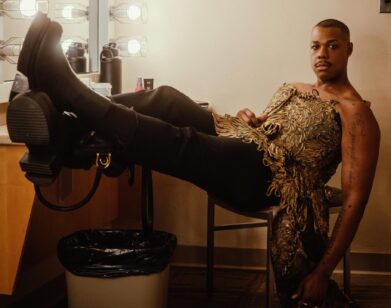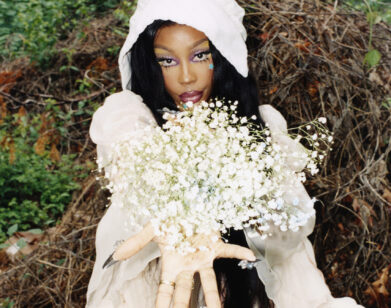Repurposing Love
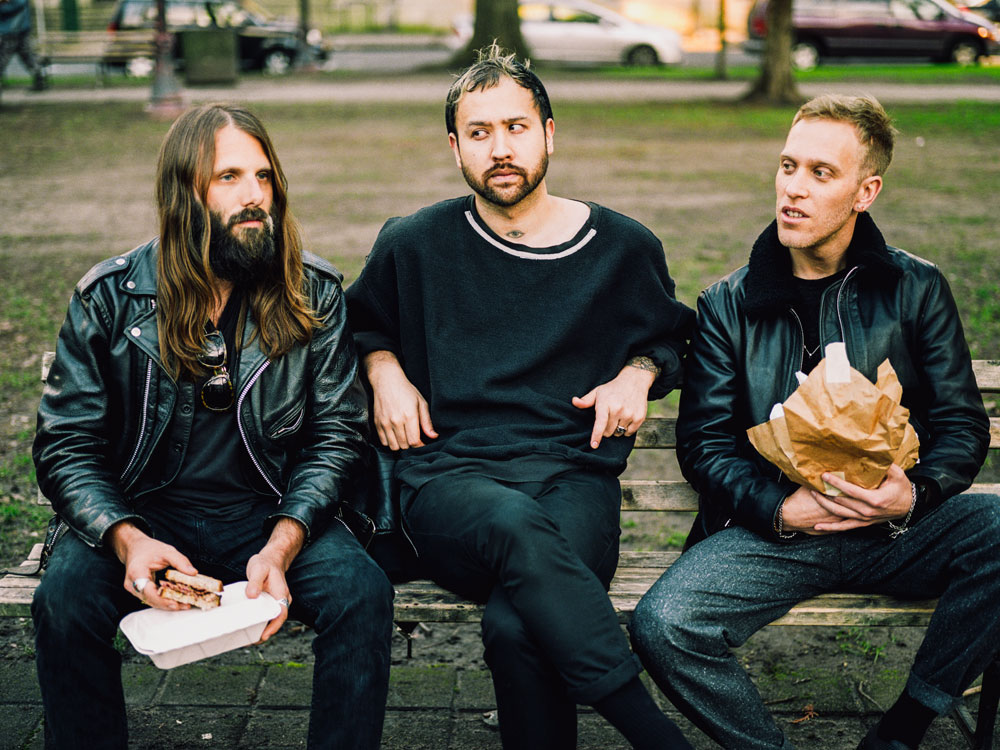
ABOVE: UNKNOWN MORTAL ORCHESTRA. PHOTO COURTESY OF DUSDIN CONDREN.
As the mastermind behind the Portland band Unknown Mortal Orchestra, Ruban Nielson’s first recordings came as a happy accident, written just months after he called it quits as a professional musician. Following UMO’s playfully expansive—and surprisingly well-received—self-titled debut, Nielson gave us II, a record filled with curious guitars, sizzling tension, and rampant references to isolation, loneliness, and depression. It was an album indicative of life on the road and, perhaps ironically, one that would keep him far from his family for more than a year after its release.
“When you’re on tour you can’t really afford to have a nervous breakdown, so you turn to certain things to numb yourself or make it bearable,” Nielson recalls from his home in Portland. “We were working and playing so hard that it got to the point where we were about to turn into the cliché. I [came home and] changed a lot of things in my life. Figuring out how to tour that much and not ruin your life was quite a big priority for me.”
This week, UMO resurfaces with Multi-Love, a lush, bizarre, future-funk collection that feels far removed from the darkness of its predecessor. For the album’s making, Nielson immersed himself in his basement, started building his own fleet of analog synths, and entertained a whole lot of heady thoughts about his relationships, his family, and where he fit into an increasingly complex home life. The result is a twisted mix of sonic touchstones, anchored by some of the most multifarious and abstracted lyrics Nielson has written to date.
ALY COMINGORE: I know you have two little kids. After spending the better part of a year at home, do you feel like they have a pretty good understanding of what you do?
RUBAN NIELSON: They do now. They’ve seen me play a couple times, but the first time they watched me play they had so many questions. They didn’t realize I play the guitar in front of people. They think my job is to be in the basement. They think that playing guitar is a solitary thing that people do in front of a computer or with recording equipment. They were pretty mind blown. I played this in-store and they were there and it was just like, “What? Who are these people who are looking at my dad?” It was pretty cool.
COMINGORE: Do you want to talk a little bit about “multi-love” as a title?
NIELSON: I thought of that phrase one day, kind of at the beginning of being home, it just popped into my head. Usually the most important ideas just kind of appear. [laughs] I try not to think about them all that much and then they start to make sense later. I stumbled onto that phrase and I didn’t really know what it meant, but as soon as I thought of it I thought it might be the name of the album. I started the process of unpacking those two words put together and it started feeling very synchronistic. The more I thought about it, the more I could see it in things I was reading and what was happening in my life.
COMINGORE: In your mind, what does it mean?
NIELSON: I think it means a lot of things, but I think the reason it jumped out to me in the beginning was because I was thinking about the ’60s a lot when I was making the last two records. I went to China recently and it changed me. In places like Shanghai, they don’t have the luxury of living in whatever era is their favorite. In America, of all the luxuries we have, we can kind of choose what timeframe we want to live in. In Shanghai, you walk outside and you’re in 2015 and there’s no escaping that. So “multi-love” is a way of repurposing the idea of the capital-L-Love that I was obsessed with through the Beatles and Sly and the Family Stone and bands from the ’60s and early ’70s. I’m trying to make it stronger and more relevant to the situation we’re in now, considering all the things that haven’t really changed.
COMINGORE: Your dad plays on the record. Was that his idea or yours?
NIELSON: [laughs] It’s funny. My dad’s a musician and I grew up around him talking about music, so I’m always kind of weirdly looking for his approval. I think this album is the first thing I’ve done that he’s actually been impressed by. I sent him “Necessary Evil” just to get some feedback and he liked it so much that he told me, “I can hear some horns on that.” He used to be a session musician, but now people send him stuff and he records horns and sends it back, so he just did that with my thing, but the piece that he wrote ended up being one of the most important parts of the song. But I don’t really have a father/son relationship with my dad. I feel like he’s just some guy that I’m friends with. [laughs]
COMINGORE: Tell me about the synths on the album. You built a bunch of them yourself, right?
NIELSON: Yeah, it was the logical thing that came out of me fixing my own guitars. When something would go wrong I’d get impatient; I didn’t want to send it away for somebody to give to somebody and then wait for four days to get it back, so I started to pull my guitars apart and ruin them. I tried and failed a lot, but then I started getting better at it and it kind of progressed from that to guitar pedals to oscillators. It became a hobby and a nice way to do something nerdy and quiet—something that had a definite measure of success and failure. Art is so subjective, so it’s nice to have something that’s more scientific, where if you plug it and it works then you succeeded. Now I’m starting to work on studio equipment. I’m totally down the rabbit hole.
COMINGORE: You had more or less quit pursuing music when those early UMO songs started attracting attention. Three albums later, what is it that makes you want to keep writing?
NIELSON: I think I’m just trying to keep connected to the thing that made me interested in getting back into it in the first place. When I was doing the first album I really thought I was making music for myself and I really detached myself and resigned myself to the thought that nobody was going to like it. I remember putting down a guitar solo and thinking, “I’m playing guitar solos. Nobody is going to like this now because guitar solos are not cool.” And then when it started getting interest from people… on some level I realized that I made what I liked and it connected with people, which made me realize that I’m not all that different from people. I’m also addicted to this feeling of sitting in the basement in the middle of the night and getting that piece of music that does the thing I like. When I finished the chorus to “Multi-Love” I figured out that I’d been groping towards it. I knew the feeling that I wanted, but I couldn’t choose the right notes, the right words. And then when it happened it was beyond any kind of drug or anything; I just kinda fell over and had this weird feeling of euphoria. If that happens to me when I’m making it, that’s got to translate somewhat. It’s got to be baked into it. That’s all of I’ve got to go on.
UNKNOW MORTAL ORCHESTRA’S MULTI-LOVE IS NOW OUT VIA JAGJAGUWAR. FOR MORE ON THE BAND, VISIT ITS WEBSITE.


